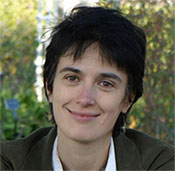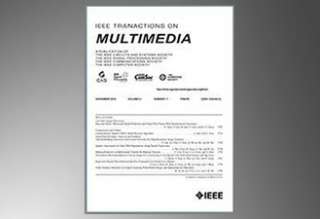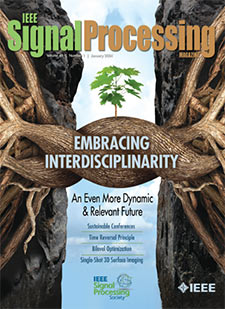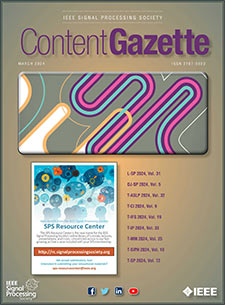- Our Story
- Publications & Resources
- Publications & Resources
- Publications
- IEEE Signal Processing Magazine
- IEEE Journal of Selected Topics in Signal Processing
- IEEE Signal Processing Letters
- IEEE/ACM Transactions on Audio Speech and Language Processing
- IEEE Transactions on Computational Imaging
- IEEE Transactions on Image Processing
- IEEE Transactions on Information Forensics and Security
- IEEE Transactions on Multimedia
- IEEE Transactions on Signal and Information Processing over Networks
- IEEE Transactions on Signal Processing
- IEEE TCI
- IEEE TSIPN
- Data & Challenges
- Submit Manuscript
- Guidelines
- Information for Authors
- Special Issue Deadlines
- Overview Articles
- Top Accessed Articles
- SPS Newsletter
- SigPort
- SPS Resource Center
- Publications Feedback
- Publications FAQ
- Blog
- News
- Dataset Papers
- Conferences & Events
- Community & Involvement
- Professional Development
- For Volunteers
- Information for Authors-OJSP
-
Home
Conferences Events IEEE JSTSP Article IEEE Signal Processing Magazine IEEE TIFS Article IEEE TMM Article IEEE TSP Article Jobs in Signal Processing Lectures Machine Learning Seasonal Schools Signal Processing News SPM Article SPS Distinguished Lectures SPS Newsletter Article SPS Webinar SPS Webinars SPS Webinar Series Webinar webinars
-
Our Story
What is Signal Processing?

The technology we use, and even rely on, in our everyday lives –computers, radios, video, cell phones – is enabled by signal processing. Learn More » -
Publications & Resources
-
SPS Resources
- Signal Processing Magazine The premier publication of the society.
- SPS Newsletter Monthly updates in Signal Processing
- SPS Resource Center Online library of tutorials, lectures, and presentations.
- SigPort Online repository for reports, papers, and more.
- SPS Feed The latest news, events, and more from the world of Signal Processing.
-
SPS Resources
-
Conferences & Events
-
Community & Involvement
-
Membership
- Join SPS The IEEE Signal Processing Magazine, Conference, Discounts, Awards, Collaborations, and more!
- Chapter Locator Find your local chapter and connect with fellow industry professionals, academics and students
- Women in Signal Processing Networking and engagement opportunities for women across signal processing disciplines
- Students Scholarships, conference discounts, travel grants, SP Cup, VIP Cup, 5-MICC
- Young Professionals Career development opportunities, networking
- Get Involved
-
Technical Committees
- Applied Signal Processing Systems
- Audio and Acoustic Signal Processing
- Bio Imaging and Signal Processing
- Computational Imaging
- Image Video and Multidimensional Signal Processing
- Information Forensics and Security
- Machine Learning for Signal Processing
- Multimedia Signal Processing
- Sensor Array and Multichannel
- Signal Processing for Communication and Networking
- Signal Processing Theory and Methods
- Speech and Language Processing
- Technical Working Groups
- More TC Resources
-
Membership
-
Professional Development
-
Professional Development
- Mentoring Experiences for Underrepresented Young Researchers (ME-UYR)
- Micro Mentoring Experience Program (MiME)
- Distinguished Lecturer Program
- Distinguished Lecturers
- Distinguished Lecturer Nominations
- Past Lecturers
- Distinguished Industry Speaker Program
- Distinguished Industry Speakers
- Distinguished Industry Speaker Nominations
- Industry Resources
- IEEE Training Materials
- Jobs in Signal Processing: IEEE Job Site
-
Career Resources
- SPS Education Program Educational content in signal processing and related fields.
- Distinguished Lecturer Program Chapters have access to educators and authors in the fields of Signal Processing
- PROGRESS Initiative Promoting diversity in the field of signal processing.
- Job Opportunities Signal Processing and Technical Committee specific job opportunities
- Job Submission Form Employers may submit opportunities in the area of Signal Processing.
-
Professional Development
-
For Volunteers
-
For Board & Committee Members
- Board Agenda/Minutes* Agendas, minutes and supporting documentation for Board and Committee Members
- SPS Directory* Directory of volunteers, society and division directory for Board and Committee Members.
- Membership Development Reports* Insight into the Society’s month-over-month and year-over-year growths and declines for Board and Committee Members
-
For Board & Committee Members
Popular Pages
Today's:
- Submit a Manuscript
- Information for Authors
- (MLSP 2024) 2024 IEEE International Workshop on Machine Learning for Signal Processing
- IEEE Transactions on Image Processing
- IEEE/ACM Transactions on Audio Speech and Language Processing
- IEEE Signal Processing Letters
- Conferences & Events
- IEEE Transactions on Multimedia
- Signal Processing 101
- (SLT 2024) 2024 IEEE Spoken Language Technology Workshop
- IEEE Transactions on Information Forensics and Security
- IEEE Transactions on Signal Processing
- IEEE Journal of Selected Topics in Signal Processing
- (ICASSP 2025) 2025 IEEE International Conference on Acoustics, Speech and Signal Processing
- Conference Call for Papers
All time:
- Information for Authors
- Submit a Manuscript
- IEEE Transactions on Image Processing
- 404 Page
- IEEE/ACM Transactions on Audio Speech and Language Processing
- IEEE Transactions on Information Forensics and Security
- IEEE Transactions on Multimedia
- IEEE Signal Processing Letters
- IEEE Transactions on Signal Processing
- Conferences & Events
- IEEE Journal of Selected Topics in Signal Processing
- Information for Authors-SPL
- Conference Call for Papers
- Signal Processing 101
- IEEE Signal Processing Magazine
Last viewed:
- A Message from the New Society President
- Information for Authors
- IEEE Transactions on Image Processing
- (ICIP 2025) 2025 IEEE International Conference on Image Processing
- SPS SLTC/AASP TC Webinar: End-to-End Automatic Speech Recognition
- Guidelines
- Beam Squint and Channel Estimation for Wideband mmWave Massive MIMO-OFDM Systems
- Submit a Manuscript
- Interspeech 2018 Conference Review
- (SLT 2024) 2024 IEEE Spoken Language Technology Workshop
- IEEE Signal Processing Letters
- Publications Board
- Editorial Board
- Guidelines for Reviewers
- Editorial Board
Series to Highlight Women in Signal Processing: Prof. Mihaela van der Schaar
You are here
Newsletter Menu
Newsletter Categories
Top Reasons to Join SPS Today!
1. IEEE Signal Processing Magazine
2. Signal Processing Digital Library*
3. Inside Signal Processing Newsletter
4. SPS Resource Center
5. Career advancement & recognition
6. Discounts on conferences and publications
7. Professional networking
8. Communities for students, young professionals, and women
9. Volunteer opportunities
10. Coming soon! PDH/CEU credits
Click here to learn more.
News and Resources for Members of the IEEE Signal Processing Society
Series to Highlight Women in Signal Processing: Prof. Mihaela van der Schaar
 Mihaela van der Schaar
Mihaela van der Schaar
University of Cambridge
Prof. Mihaela van der Schaar is the John Humphrey Plummer Professor of Machine Learning, Artificial Intelligence and Medicine at the University of Cambridge, a Fellow at The Alan Turing Institute in London, and a Chancellor’s Professor at UCLA.
Mihaela was elected IEEE Fellow in 2009. She has received numerous awards, including the Oon Prize on Preventative Medicine from the University of Cambridge (2018), a National Science Foundation CAREER Award (2004), 3 IBM Faculty Awards, the IBM Exploratory Stream Analytics Innovation Award, the Philips Make a Difference Award and several best paper awards, including the IEEE Darlington Award.
Mihaela’s work has also led to 35 USA patents (many widely cited and adopted in standards) and 45+ contributions to international standards for which she received 3 International ISO (International Organization for Standardization) Awards.
In 2019, she was identified by National Endowment for Science, Technology and the Arts as the most-cited female AI researcher in the UK. She was also elected as a 2019 “Star in Computer Networking and Communications” by N²Women. Her research expertise spans signal and image processing, communication networks, network science, multimedia, game theory, distributed systems, machine learning and AI.
Mihaela’s research focus is on machine learning, AI and operations research for healthcare and medicine.
In addition to leading the van der Schaar Lab, Mihaela is founder and director of the Cambridge Centre for AI in Medicine (CCAIM).
We approached Professor Mihaela van der Schaar with a few questions:
1. What was the most important factor in your success?
It is easy: I love my job!
As far as I’m concerned, being an engineer and computer scientist is simply the best job in the world, and it’s not even close. It’s a fantastic canvas for creation, experimentation, and innovation. You’re presented with a limitless array of unique and important problems to choose from, and there are so many potential angles from which to approach the solutions. This is why it’s been so easy to keep applying myself day in, day out for decades: the work never gets boring!
This is why I think it’s a great shame that young people (especially women) are still somehow sold this enduring narrative that engineering and computer science make for dry, bookish, analytical “left brain” careers. In reality, there are few more creative or exciting areas to work in, but it’s been incredibly hard to dismantle this ingrained misperception.
In addition to loving the subject matter of the work itself, my other source of motivation has been my students. Over the years, I’ve been fortunate to have worked with some absolutely brilliant students; it’s such a privilege to be able to offer them mentorship and guidance, and to help them grow. They offer new perspectives and help me see my own work in a new light. Again, it makes the work incredibly dynamic, stimulating, and challenging.
2. Failures are an inevitable part of everyone’s career journey, what is the most important lesson you learned during your career when dealing with failures?
I’m fortunate to have started my career with something of a bang: during and after my PhD I had been working with a sort of feverish intensity, and had taken the lead on some truly impactful projects in the area of multimedia signal processing, compression, and communication.
After a while, I decided to switch specialty to game theory - I found the area interesting and felt I had fresh ideas to contribute within the area. To my surprise, though, I soon started getting a definite sense that my work wasn’t gaining as much traction as my previous work had. Perhaps there was just a mismatch between myself and the area of game theory, or perhaps it was just the wrong time for me to be active in that area; for whatever reason, it was difficult to get people engaged with the work I was doing. I also started to wonder whether this was an area in which I could actually make a positive impact on society.
Looking back, I should probably have reassessed my circumstances and moved on quickly. Instead, I tried to stick it out and turn things around, reasoning that I didn’t want to write off the time and resources I’d already invested. This simply prolonged the situation. Eventually, I came to my senses and switched specialty again—to machine learning for healthcare - and I couldn’t believe how quickly everything picked up for me. Everything started clicking, and hasn’t stopped since then!
For me, the enduring lesson was: if you’ve made a career misstep, be honest with yourself and think very carefully before doubling down. Changing direction isn’t quitting: it means learning from your experience and moving on to something that’s better suited to you.
3. Please share your important works of societal impact with us.
The two areas of work I’m proudest of are actually from the earliest and latest points in my career.
Starting with the former: during my PhD I was working full-time for Philips Research. My thesis was on system and network constrained scalable video compression, and at Philips I was project managing teams working on internet video, adaptive video, and quality of service for IP wireless networks. The work I did (for example, on scalable video coding) laid much of the groundwork for international standards for compression and transmission of video over networks. This was very impactful at the time, since this was exactly when society itself was really starting to get online, but it’s also amazing to think that the same technologies have enabled the staggering growth of streaming video and online teleconferencing into what they have become.
Fast-forward to today, and my lab and I are now breaking new ground in machine learning for healthcare. We are applying our methods to medical problems as diverse as organ transplantation, COVID-19, cancer, Alzheimer’s, cystic fibrosis, and many more. We are working in close coordination with a range of global stakeholders including non-profits, national and local healthcare providers, and pharmaceutical companies, with the shared goal of catalyzing a revolution in healthcare. The potential for social impact is enormous, and I am so excited to be able to lead the way again.
4. In your opinion, what are some of the most exciting areas of research for students and upcoming researchers?
I believe that the most exciting areas are the ones that have potential to create new frontiers for machine learning.
Healthcare is perhaps the best example of this: of course, there’s incredible potential for societal impact (as I mentioned above), but there is also unlimited scope to explore and experiment with new methodologies and approaches. This is because medicine stands apart from other areas where machine learning can be applied.
Where we have seen advances in other fields driven by lots of data, it is the complexity of healthcare, not the volume of data, that makes the challenge so hard. Solving problems in healthcare requires the development of methods that break the barriers between machine learning, statistics, and mathematics. In my opinion, this makes healthcare the most exciting area for anyone who is really interested in exploring the boundaries of machine learning.
Our lab has developed new methodologies in areas such as deep learning, automated machine learning, causal inference, time series analysis, transfer learning, reinforcement learning, synthetic data generation and analysis, and uncertainty estimation (among others). We have even created an entirely new area of research called quantitative epistemology, which applies machine learning to understanding, supporting, and improving human knowledge acquisition and decision-making. This is all thanks to inspiration from real-world problems in healthcare.
5. What challenges do you think our current student population faces as far as preparedness in these areas is concerned? What would you suggest to these upcoming researchers?
It seems to me that there are 2 challenges facing students today.
The first is the speed of innovation and change in the various areas and disciplines of engineering and computer science. This is definitely true in machine learning and artificial intelligence, my area. This means you will need to develop a strong knowledge of the fundamentals, while also learning to acquire new skills and adapt rapidly as these disciplines continue to evolve.
The second challenge is simply the scale and the number of people working in the area, and the diversity of activities. You have to be able to recognize innovations and changes across vast, often inter-disciplinary areas that may be relevant to your work or research, and adapt, change perspective, and learn new skills.
To learn more about Prof. Mihaela van der Schaar, please visit her webpage.
Open Calls
Initiatives & Trends
Member Highlights
Industry Leaders in Signal Processing and Machine Learning
Education & Resources
Society News
- 108 Signal Processing Society Members Elevated to Senior Member!
- Updated SPS Chapter Logo Usage and Branding Guidelines
- Job Opportunities in Signal Processing
- Call for Nominations: Awards Board Chair and Fellow Evaluation Committee - Chair and Vice Chair Positions
- Call for Nominations: SPS Chapter of the Year Award
Chapter & DL News
SPS on Twitter
- DEADLINE EXTENDED: The 2023 IEEE International Workshop on Machine Learning for Signal Processing is now accepting… https://t.co/NLH2u19a3y
- ONE MONTH OUT! We are celebrating the inaugural SPS Day on 2 June, honoring the date the Society was established in… https://t.co/V6Z3wKGK1O
- The new SPS Scholarship Program welcomes applications from students interested in pursuing signal processing educat… https://t.co/0aYPMDSWDj
- CALL FOR PAPERS: The IEEE Journal of Selected Topics in Signal Processing is now seeking submissions for a Special… https://t.co/NPCGrSjQbh
- Test your knowledge of signal processing history with our April trivia! Our 75th anniversary celebration continues:… https://t.co/4xal7voFER
Home | Sitemap | Contact | Accessibility | Nondiscrimination Policy | IEEE Ethics Reporting | IEEE Privacy Policy | Terms | Feedback
© Copyright 2024 IEEE – All rights reserved. Use of this website signifies your agreement to the IEEE Terms and Conditions.
A not-for-profit organization, IEEE is the world's largest technical professional organization dedicated to advancing technology for the benefit of humanity.









